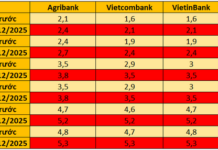The recent increase in the base salary has impacted the income of civil servants and public sector employees differently. While those receiving state budget salaries have already benefited from the change, employees of public service units with financial autonomy are still awaiting their turn. This uncertainty has left many anxious about their financial prospects.

The salary increase for civil servants in financially autonomous public service units depends on the agency’s wage fund. (Illustrative image)
Anxious Anticipation for a Salary Increase
The base salary increase, effective July 1st, has already been reflected in the salaries of civil servants and public sector employees paid from the state budget. However, for civil servants in financially autonomous public service units, the situation is different. They are still waiting anxiously for their salaries to catch up.
Le Ngoc (name changed), a civil servant at a financially autonomous media agency in Hanoi, shared her monthly income, which includes a basic salary (base salary multiplied by a coefficient), allowances (for transportation, phone bills, and lunch), performance-based bonuses, and royalties. With a coefficient of 2.69, Ngoc estimates her current basic salary to be around 4.8 million VND per month, with total earnings ranging between 11 and 13 million VND per month.
“We were excited to hear about the 30% base salary increase, hoping that it would boost our income and motivate us further,” she shared. “With the rising cost of living, this increase would have been a welcome relief.”
However, Ngoc and her colleagues are now concerned that their total monthly income might not change at all. This is because the agency’s wage fund remains unchanged, and any increase in the base salary might result in a decrease in other income streams, such as royalties.
Thu Ngân (name changed), an accountant at a financially autonomous media agency in Hanoi with 250 employees, expressed her uncertainty about the situation. With the recent economic challenges and a decrease in revenue, it has become difficult for the agency to allocate additional funds for salary increases. The leadership is faced with the challenging task of balancing the books while considering this unexpected expense.
“The last time the base salary increased in July 2023, from 1.49 million VND to 1.8 million VND per month, it was already a difficult adjustment for us,” she said. “With this new increase, if we can’t find a way to allocate more funds, it might be impossible.”
The situation is further complicated by the fact that, along with the increase in base salary, the agency also has to contribute more to social insurance and other related expenses. As a result, they are considering reducing other income streams to compensate, which might leave employees in the same financial position as before.
Trần Mỹ Linh (name changed), an employee at the investment project management board of a department in Hanoi, raised a valid concern. According to Resolution 27 on salary reform, is their agency required to increase the salaries of civil servants? Without prior preparation and facing financial constraints, they worry about the consequences of not being able to implement the increase.
“We haven’t set aside funds for a salary increase, and doing so now would be challenging,” she shared. “I wonder if we’ll be penalized if we don’t raise salaries. It’s a concern for all of us.”
As of the end of 2023, there were nearly 46,400 public service units in the country. Approximately 11,440 of these, or about 25%, are financially autonomous (including groups with full or partial regular expenditure assurance and those with regular and investment expenditure assurance).
Benefits for Civil Servants Also Increase with Salary
The increase in the base salary has a positive impact on various benefits for civil servants. Phạm Hiền (name changed), a civil servant at a public service unit in Hanoi, is expecting to go on maternity leave in November and receive social insurance benefits. She has learned that with the increase in the base salary, her maternity benefits might also increase.
Currently, the base salary is used to calculate retirement pensions, social insurance benefits, and contributions to social insurance, health insurance, and unemployment insurance. For example, unemployment benefits are set at 60% of the average monthly salary of the previous six months, subject to a maximum of five times the base salary for civil servants and public sector employees. As a result, the maximum unemployment benefit has increased to 11.7 million VND.
Other benefits, such as sick leave and maternity benefits, have also increased since July 1. The daily rate for convalescence after sick leave or maternity leave is now 30% of the base salary, or 702,000 VND per day, a rise of 162,000 VND from the previous rate. A one-time childbirth allowance for women has increased to 4.68 million VND per child, up from 3.6 million VND. The funeral allowance has also increased to 23.4 million VND, equivalent to ten times the base salary.
Additionally, benefits for those unfortunate enough to suffer from work-related accidents or occupational diseases have also increased, including one-time assistance, monthly allowances, and caregiver allowances.
Minister Dao Ngoc Dung: Wage reform must be accompanied by pension adjustment.
If the salaries of civil servants and officials increase by 23.5% after the reform, the pension at least must increase by 15%.
Chairman of the SSC: Enhancing the Stock Market’s Reliance on Foreign Investor Experience.
On the sidelines of the Gong-beating Ceremony to mark the opening of the 2024 Lunar New Year trading session at the Ho Chi Minh City Stock Exchange (HOSE) on the morning of February 19th, 2024, Chairwoman of the State Securities Commission Vu Thi Chan Phuong shared her insights on market upgradation as well as her assessment of the market’s prospects for the new year.









































